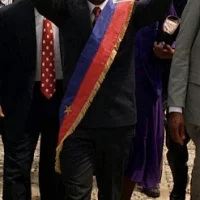Haiti has long been plagued by coups d’état and regime changes, leading to long-time political instability and weak governance. In this volatile political field, it was easy for a Haitian leader to assume dictatorial powers, as was the case with President François Duvalier, also known as “Papa Doc.” After becoming the President of Haiti in… Read More "The Overthrow of Haiti’s Aristide"
Lesley Dorman and the Founding of FLO
Lesley Tanburn Dorman devoted her life to her own family and to her wider family – the Foreign Service. Her work to help the families of Foreign Service Officers contributed to the creation of the Family Liaison Office (FLO) at the State Department. Born in England, she met her husband Philip in London, where he… Read More "Lesley Dorman and the Founding of FLO"
The Siberian Seven: Escaping Religious Persecution in the U.S.S.R.
From its inception, the Soviet Union became the first state in the world to actively attempt to eliminate religion from society. Religion was viewed by Soviet leadership as counter-intuitive to scientific reason and as a threat to the consolidation and exertion of state power. Correspondingly, under Soviet religious policy, tens of thousands of houses of worship… Read More "The Siberian Seven: Escaping Religious Persecution in the U.S.S.R."
“How many people can you fit on a 747?”- Operations Sheba and Solomon
The Ethiopian Aliyah, as it is known in Israel, was the migration during the 1980’s of thousands of Ethiopian Jews [known in Amharic as Falashas; some consider the term pejorative] to Israel. The Israeli Defense Force (IDF) played a major role in the evacuation of the Ethiopian Jews as they came under increasing threat from… Read More "“How many people can you fit on a 747?”- Operations Sheba and Solomon"
Kimberley Process: Commercial Diplomacy to Stem the Flow of Blood Diamonds
During the 1990s, several African countries, namely Angola, Cote d’Ivoire, the Democratic Republic of the Congo, Sierra Leone, and Liberia were plunged into chaos and embroiled in devastating civil wars. Thanks to economic and political insecurity and contentious inter-ethnic relations, rebel groups such as the Patriotic National Front of Liberia under the leadership of Guy… Read More "Kimberley Process: Commercial Diplomacy to Stem the Flow of Blood Diamonds"
Beginning of a Beautiful Friendship: The 1951 Treaty of Peace with Japan
The San Francisco Peace Treaty, signed by 48 nations on September 8, 1951, officially ended Japan’s position as an imperial power, provided compensation to those who had suffered in Japan during the Second World War, and terminated the Allied post-war occupation of Japan. The treaty’s seven chapters and preamble marked the end of hostilities between the signatories… Read More "Beginning of a Beautiful Friendship: The 1951 Treaty of Peace with Japan"
The ACDA-USIA Merger into State — The End of of an Era
As the Cold War began to go into full swing, the United States soon realized the need for distinct agencies that would operate outside of the existing federal executive departments. Accordingly, independent agencies such as the U.S. Arms Control and Disarmament Agency (ACDA) and the United States Information Agency (USIA) were created in 1961 and… Read More "The ACDA-USIA Merger into State — The End of of an Era"
The Long, Incomplete Road for the Comprehensive Test Ban Treaty
The movement to limit or even prohibit the testing of nuclear weapons has been around almost since the dawn of the nuclear age itself. Concern over harming the environment and causing widespread damage to human life led to the Limited Test Ban Treaty in 1963 and the 1974 Threshold Test Ban Treaty, which limited underground… Read More "The Long, Incomplete Road for the Comprehensive Test Ban Treaty"
“The Cold War Was Truly Over” — The 1986 Reykjavik Summit
After the 1985 Geneva Summit, where President Ronald Reagan and leader of the Soviet Union, Mikhail Gorbachev, met for the first time, the Reykjavik Summit, held on October 11-12, 1986, presented an opportunity to try to reach an agreement between the two sides on arms control. While Gorbachev wanted to ban all ballistic missiles and limit the talks… Read More "“The Cold War Was Truly Over” — The 1986 Reykjavik Summit"
Anwar Sadat and the Camp David Negotiations
The Camp David Accords, which were negotiated over a period of twelve days in 1978 between Egyptian, Israeli, and American delegations at the Presidential retreat of Camp David, Maryland, marked a historical watershed as Egypt became the first Arab state to recognize Israel. It led to the signing of the Egypt-Israel Peace Treaty in 1979.… Read More "Anwar Sadat and the Camp David Negotiations "

